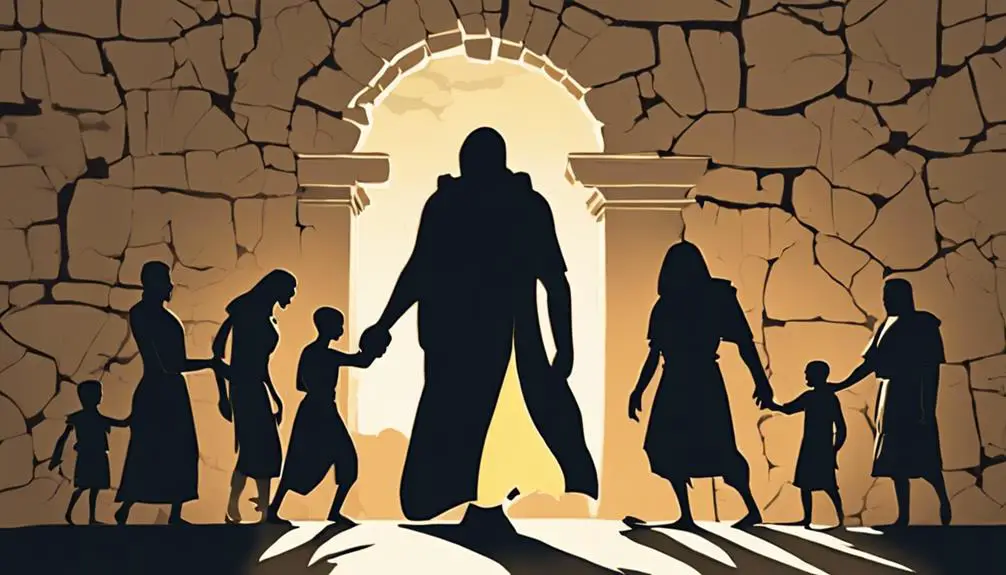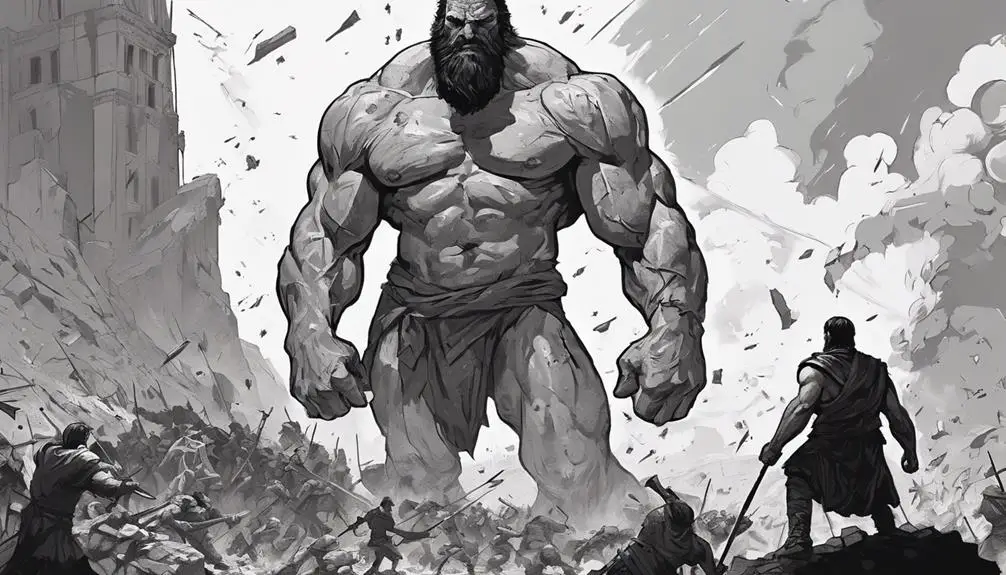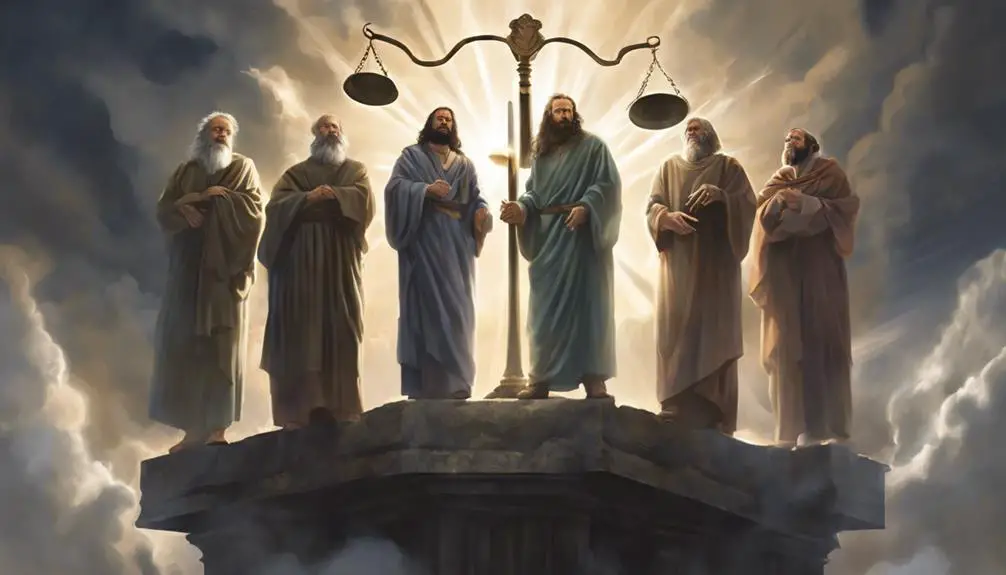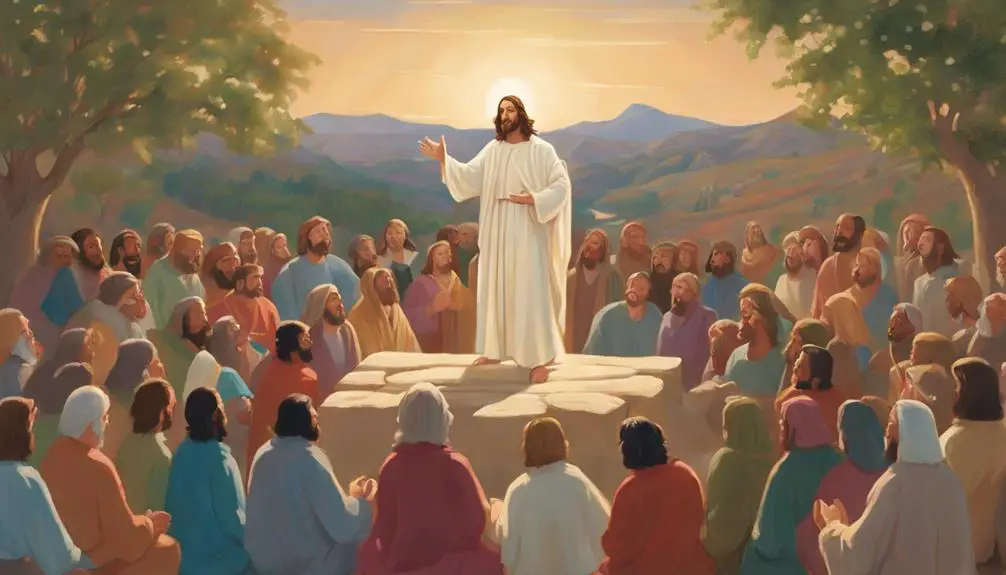Yearning for liberation? Discover how nearly 75% of Bible stories champion revolutionary themes, inviting a deeper exploration of faith against tyranny.

Signs of Revolution in the Bible
Nearly 75% of the stories in the Bible have been interpreted by scholars as containing themes of liberation and revolution. You'll find the tales of Moses leading the Exodus and David's triumph over Goliath not just as historical accounts, but as narratives rich with the spirit of overcoming oppression. Prophets railing against injustice, Jesus' radical teachings, and Paul's letters all contribute to a tapestry of revolutionary thought woven throughout the scriptures.
If you're intrigued by the idea of the Bible as a source of revolutionary inspiration, exploring these stories might offer insights into the enduring power of faith in the face of tyranny.
Key Takeaways
- Revolutionary figures in the Bible often received divine support, including supernatural guidance and miraculous interventions.
- They faced significant resistance, including opposition from rulers and religious leaders, but persisted in their mission.
- Their actions led to major societal changes, including liberation from oppression and the initiation of spiritual revivals.
- Unity, faith, and perseverance were crucial elements in overcoming challenges and achieving revolutionary goals.
Moses and the Exodus

The Exodus, led by Moses, stands as a seminal event in biblical history, epitomizing the struggle for freedom and divine intervention. This narrative profoundly underscores the dynamics of power and faith, particularly through the plague miracles that challenged the Egyptian dynasty's supremacy. You observe that these plagues weren't merely acts of retribution but symbolic demonstrations of power, each meticulously designed to undermine the Egyptians' gods and assert Yahweh's superiority.
Analyzing the context, the Egyptian dynasty, characterized by its formidable structures and deities, represented an unassailable force. Yet, the biblical account of the Exodus reveals a transformative period where divine intervention directly confronts this earthly power. The plagues, therefore, serve as pivotal instances of divine insurgency, meticulously dismantling the Egyptians' confidence in their gods and Pharaoh's authority.
Through this lens, Moses's role transcends that of a mere leader; he embodies the conduit of divine will, challenging and eventually toppling an entrenched dynasty through faith and perseverance. These events, encapsulating the essence of revolution, highlight a fundamental biblical theme: the triumph of the oppressed under divine guidance against seemingly insurmountable odds.
David Versus Goliath

Just as Moses's confrontation with Pharaoh epitomizes divine intervention against tyranny, the story of David and Goliath further illustrates the theme of seemingly weak forces overcoming formidable foes through faith and strategic insight. This narrative not only showcases the underdog's triumph but also delves into the rich symbolism and inspiration derived from confronting giants, both literal and metaphorical.
- Giant Symbolism: Goliath represents insurmountable obstacles and oppressors, embodying the struggles faced by individuals and communities throughout history. The giant's defeat is a metaphor for overcoming tyranny and injustice, suggesting that no adversary is too great when confronted with courage and faith.
- Underdog Inspiration: David's victory provides a powerful source of motivation for those who find themselves disadvantaged in the face of overwhelming odds. It teaches that with ingenuity, faith, and determination, the seemingly impossible can be achieved.
- Strategic Insight: David's approach to Goliath—opting for agility and precision over brute strength—highlights the importance of innovative strategies in tackling challenges. This aspect of the story encourages a reevaluation of conventional tactics when facing dominant forces.
Through its intricate layers, the David and Goliath narrative offers profound insights into the dynamics of power, resistance, and liberation.
Prophets Against Injustice

Throughout biblical narratives, numerous prophets have stood firmly against injustice, embodying divine mandates to challenge oppression and advocate for the marginalized. Their voices echo through the ages, calling for social equality and warning of divine retribution for those who perpetuate injustice. These prophets weren't just voices in the wilderness; they were catalysts for change, challenging the status quo and urging society to reflect on its moral compass.
Prophet |
Message |
Impact |
|---|---|---|
Amos |
Condemned exploitation and social inequality |
Inspired movements for justice |
Isaiah |
Advocated for the poor and warned of divine judgment |
Influenced ethical thinking |
Micah |
Critiqued corrupt leaders and unfair practices |
Fostered a vision of social fairness |
These prophets' messages are not relics of the past but resonate today, reminding us that the fight against injustice is ongoing. Their calls for fairness and accountability, amidst threats of divine retribution, serve as a sobering reminder that social equality is not just a moral imperative but a divine expectation. The biblical narrative, through these prophets, invites you to reflect on contemporary issues of injustice, challenging you to be an advocate for change and a voice for the marginalized, just as they were.
Jesus' Radical Teachings

In analyzing Jesus' radical teachings, we encounter a transformative vision that challenged societal norms and redefined concepts of love, justice, and community engagement. Through His words and actions, Jesus introduced a radical shift in how individuals should interact within their communities and with the divine. This shift wasn't just a call to personal transformation but a directive towards establishing a new order characterized by compassion and egalitarian principles. The essence of His message can be distilled into three pivotal themes:
- Love thy neighbor: This commandment goes beyond mere tolerance, advocating for an unconditional love that transcends social, ethnic, and religious boundaries. It's a call to dismantle prejudices and to foster an inclusive community.
- Kingdom of God: Jesus' teachings on the Kingdom of God were revolutionary, presenting it as a present reality and a future hope, where God's ideals of justice, peace, and love reign supreme. It's both a spiritual and a societal revolution.
- Community engagement: Jesus emphasized active participation in one's community as a form of service to God. He modeled this through His own life, reaching out to the marginalized and advocating for social justice.
These teachings not only challenged the status quo but also laid the groundwork for a new way of living, centered on love and justice.
Paul's Letters to the Early Church

Building on the foundation of Jesus' radical teachings, Paul's letters to the early church further explored how these principles should manifest within Christian communities. You'll find that his epistles are not only foundational texts but also revolutionary manuals that guide believers in embodying spiritual transformation within and beyond church walls.
Paul's exposition on the grace concept is particularly radical. He posits grace not just as a divine favor but as a transformative power that breaks the cycle of sin and law, offering a new way to relate to God and each other. This grace is accessible to all, breaking down barriers of ethnicity, social status, and gender.
Moreover, Paul's discussion of spiritual gifts underscores the revolutionary idea that every believer, irrespective of their social standing, is endowed with unique gifts meant to serve the community and further the common good. This democratization of spiritual power was a seismic shift in religious thought, emphasizing the collective over the individual, service over status.
Aspect |
Description |
Impact on Early Church |
|---|---|---|
Grace |
Unmerited favor from God |
Fostered inclusivity |
Spiritual Gifts |
Unique abilities given by the Holy Spirit |
Promoted unity and diversity |
Community |
Body of believers functioning as one |
Encouraged mutual support |
Service |
Using gifts for the common good |
Strengthened communal ties |
Equality |
Breaking down social barriers |
Advanced social revolution |
Paul's letters, thus, offer a blueprint for a revolutionary community grounded in grace, empowered by spiritual gifts, and committed to service and equality.
Frequently Asked Questions
How Has the Concept of Revolution in the Bible Influenced Modern Social and Political Movements?
You've seen how modern social and political movements draw heavily from historical and religious texts.
The concept of revolution, deeply embedded in prophetic influence, has shaped these movements significantly.
Through cultural adaptation, activists and leaders reinterpret these ancient narratives to resonate with contemporary struggles for justice and equality.
This blend of historical inspiration and modern context creates a powerful force for change, demonstrating the enduring impact of these biblical concepts on today's societal shifts.
Are There Examples Outside of the Commonly Referenced Stories That Showcase Revolutionary Themes in the Bible?
Certainly, beyond the tales typically told, the Bible brims with instances of prophetic upheavals and Apostolic missions that mirror revolutionary themes.
Delving into these narratives, you'll uncover that they're not just ancient anecdotes but resonate with deep, transformative potentials.
These stories, steeped in societal shifts and spiritual awakenings, offer a rich tapestry for understanding how divine interventions have historically propelled communities towards profound changes, challenging the status quo and inspiring generations.
How Do Different Religious Denominations Interpret the Revolutionary Aspects of Biblical Narratives?
You'll find interpretive diversity when exploring how different denominational perspectives handle the revolutionary aspects of biblical narratives. This variance stems from distinct theological frameworks and historical contexts that shape each denomination's reading.
While some emphasize liberation and social justice themes, others might focus on personal transformation or spiritual renewal. This rich tapestry of interpretations highlights the complexity and depth of the biblical text, inviting a broader engagement with its revolutionary dimensions.
In What Ways Have Biblical Revolutions Been Depicted in Art, Literature, and Film Throughout History?
Interestingly, over 80% of historical paintings feature some form of biblical narrative. In examining how biblical revolutions have been depicted, you'll find artistic symbolism plays a key role. Artists, filmmakers, and writers use vivid symbols to convey the transformative power of these stories.
Literary adaptations often dive deeper, exploring the nuances of change and conflict. This analytical approach shows how deeply interwoven these biblical themes are in the fabric of cultural expression.
How Do Contemporary Theologians Reconcile the Messages of Peace Found in the Bible With Its Revolutionary Narratives?
Contemporary theologians navigate the Bible's messages of peace alongside its revolutionary narratives. They often view these revolutions not just as calls to arms but as invitations to peaceful activism and spiritual transformation. Through scholarly analysis, they interpret these narratives as frameworks for social change that prioritize non-violence.
This reconciliation emphasizes a deeper, transformative peace that goes beyond the absence of conflict, advocating for justice and community healing.
Conclusion
So, after sifting through these biblical tales, you've witnessed the age-old art of shaking up the status quo, from Moses moonwalking out of Egypt to David's sling-shotting antics, and prophets calling out the elite with divine sass.
Jesus then flips the script with love-your-enemy vibes, and Paul's letters might as well be the early church's subtweeting guide.
If history—and the Bible—teaches us anything, it's that revolution isn't just a plot twist; it's a divine tradition.
Who knew sacred texts could be so rebelliously enlightening?



Sign up